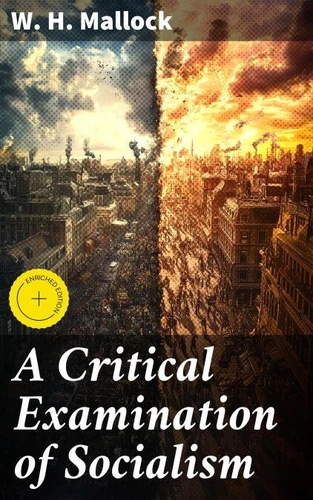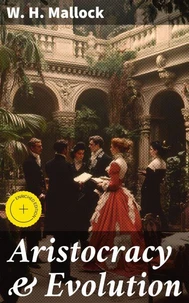A Critical Examination of Socialism. Unveiling the Fallacies of Socialist Ideology: A Thought - Provoking Critique
Par :Formats :
Disponible dans votre compte client Decitre ou Furet du Nord dès validation de votre commande. Le format ePub est :
- Compatible avec une lecture sur My Vivlio (smartphone, tablette, ordinateur)
- Compatible avec une lecture sur liseuses Vivlio
- Pour les liseuses autres que Vivlio, vous devez utiliser le logiciel Adobe Digital Edition. Non compatible avec la lecture sur les liseuses Kindle, Remarkable et Sony
 , qui est-ce ?
, qui est-ce ?Notre partenaire de plateforme de lecture numérique où vous retrouverez l'ensemble de vos ebooks gratuitement
Pour en savoir plus sur nos ebooks, consultez notre aide en ligne ici
- Nombre de pages255
- FormatePub
- ISBN406-4-06-621225-4
- EAN4064066212254
- Date de parution12/12/2019
- Protection num.Digital Watermarking
- Taille1 Mo
- Infos supplémentairesepub
- ÉditeurGOOD PRESS
Résumé
In "A Critical Examination of Socialism, " W. H. Mallock undertakes a rigorous analysis of socialist theory and its implications for society. Employing a blend of philosophical inquiry and empirical evidence, Mallock critiques socialism'Äôs foundational principles, exploring its historical context and its viability as a socio-economic model. His literary style is both incisive and provocative, marked by sharp wit and a penchant for logical argumentation.
The book, published in the late 19th century, is situated within the broader debate over capitalism and socialism, making it a significant piece in the intellectual landscape of its time. W. H. Mallock, an English writer and prominent liberal thinker, was deeply influenced by the political and economic upheavals of his era. His background in philosophy and literature equipped him with the analytical tools necessary to dissect the intricacies of social doctrine.
Mallock'Äôs firsthand experiences and observations of the changing socio-economic fabric of Victorian society further fueled his critique, as he sought to address the practical implications of socialist ideologies on individual liberty and entrepreneurship. This book is essential for anyone interested in political philosophy, economic theory, or the historical evolution of social thought. Mallock'Äôs incisive critique not only challenges the validity of socialist thought but also lays bare the implications of its application in Western society, making it a provocative read for scholars and general readers alike.
The book, published in the late 19th century, is situated within the broader debate over capitalism and socialism, making it a significant piece in the intellectual landscape of its time. W. H. Mallock, an English writer and prominent liberal thinker, was deeply influenced by the political and economic upheavals of his era. His background in philosophy and literature equipped him with the analytical tools necessary to dissect the intricacies of social doctrine.
Mallock'Äôs firsthand experiences and observations of the changing socio-economic fabric of Victorian society further fueled his critique, as he sought to address the practical implications of socialist ideologies on individual liberty and entrepreneurship. This book is essential for anyone interested in political philosophy, economic theory, or the historical evolution of social thought. Mallock'Äôs incisive critique not only challenges the validity of socialist thought but also lays bare the implications of its application in Western society, making it a provocative read for scholars and general readers alike.
In "A Critical Examination of Socialism, " W. H. Mallock undertakes a rigorous analysis of socialist theory and its implications for society. Employing a blend of philosophical inquiry and empirical evidence, Mallock critiques socialism'Äôs foundational principles, exploring its historical context and its viability as a socio-economic model. His literary style is both incisive and provocative, marked by sharp wit and a penchant for logical argumentation.
The book, published in the late 19th century, is situated within the broader debate over capitalism and socialism, making it a significant piece in the intellectual landscape of its time. W. H. Mallock, an English writer and prominent liberal thinker, was deeply influenced by the political and economic upheavals of his era. His background in philosophy and literature equipped him with the analytical tools necessary to dissect the intricacies of social doctrine.
Mallock'Äôs firsthand experiences and observations of the changing socio-economic fabric of Victorian society further fueled his critique, as he sought to address the practical implications of socialist ideologies on individual liberty and entrepreneurship. This book is essential for anyone interested in political philosophy, economic theory, or the historical evolution of social thought. Mallock'Äôs incisive critique not only challenges the validity of socialist thought but also lays bare the implications of its application in Western society, making it a provocative read for scholars and general readers alike.
The book, published in the late 19th century, is situated within the broader debate over capitalism and socialism, making it a significant piece in the intellectual landscape of its time. W. H. Mallock, an English writer and prominent liberal thinker, was deeply influenced by the political and economic upheavals of his era. His background in philosophy and literature equipped him with the analytical tools necessary to dissect the intricacies of social doctrine.
Mallock'Äôs firsthand experiences and observations of the changing socio-economic fabric of Victorian society further fueled his critique, as he sought to address the practical implications of socialist ideologies on individual liberty and entrepreneurship. This book is essential for anyone interested in political philosophy, economic theory, or the historical evolution of social thought. Mallock'Äôs incisive critique not only challenges the validity of socialist thought but also lays bare the implications of its application in Western society, making it a provocative read for scholars and general readers alike.







